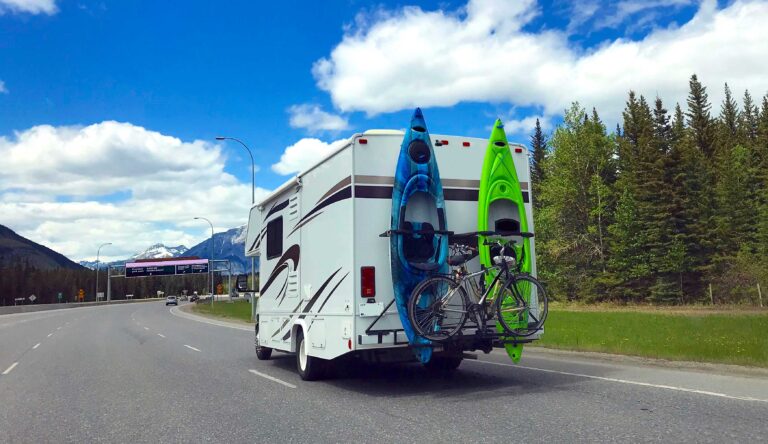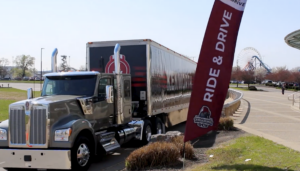An old joke asserts that “In <insert any region here> there are only two seasons — winter and road construction.” It’s certainly true that more road construction happens during the warmer months, particularly summertime, when inclement weather is less likely to be a factor.
However, construction isn’t the only summertime road hazard faced by commercial drivers. Numerous hazards are created by other drivers and their vehicles.
In most of North America, school’s out during summer months. One bonus is that there are fewer school buses stopping to pick up or discharge passengers and fewer school zones with reduced speed limits. However, many students end up sharing the interstates and highways with commercial vehicles once they’re out for summer break.
Some may be young, inexperienced drivers making a trip to the beach or other popular location. Their inexperience can be hazardous enough, but poor judgment can also come into play as young drivers are distracted by phones and other devices (of course, many experienced adult drivers are also prone to such distractions). In addition, a car full of teenagers may be wrapped up in conversation about friends or activities, and the driver may be distracted from the task of driving.
While any vehicle can represent a hazard to others on the road, those piloted by younger drivers can be especially unpredictable. At the other end of the spectrum, older drivers may be dealing with diminishing vision and slower reaction times. Some haven’t driven on an interstate or other multi-lane highway in a long time, while others may be used to taking public transportation to work and to run errands, and haven’t driven at all in a while.
Summer road trips can pose another hazard. Drivers whose travel is usually restricted to short, in-town trips may not be accustomed to driving for the long period of time it may take to get to the beach, the mountains or to Grandma’s house. Some may get distracted, and fatigue can also impact driving skills.
In addition, summertime celebrations may include consumption of alcohol, and recreational use of marijuana is increasing due to legalization in many states. Drivers may not consider their levels of impairment as they pack family and friends into the car for the trip home. And, unfortunately, some drivers may continue the celebration while they are behind the wheel. It’s always smart to keep an eye out for drivers who are under the influence of any substance that can impact their driving.
As the driver of a commercial vehicle, it’s important to pay close attention and be prepared if a driving mistake should occur at any time of the year, whether the fault is another driver’s or your own.
Vehicle types can also play a large role in highway safety. Commercial vehicle drivers are trained to handle the size and weight of their vehicle, but that’s often not the case with drivers pulling trailers or driving large recreational vehicles.
Class A RVs are the size of passenger buses (in fact, they’re often built on the same chassis and foundation as buses), yet in many states, anyone who can afford the payments can drive one off the lot with no additional training.
Camper trailers, especially fifth-wheel trailers, can be longer in length than some tractor-trailers. Drivers may be inexperienced in navigating traffic and can have difficulty maintaining their lane or estimating stopping distances.
In addition, weight distribution can be quirky, because of the positioning of heavy water tanks and appliances. Families loading personal gear and provisions for a summer road trip are likely to arrange storage according to available space and ability to secure cargo rather than considering weight distribution. Trailers that have been packed with too much weight at the rear can be very difficult to control, particularly at higher speeds.
Crosswinds can make it difficult to navigate a tractor-trailer, and the effect on recreational vehicles can be even worse. The lighter weight and broad surface area of a camper can make it nearly impossible to control in heavy winds.
Boats are another item that make an appearance on summer highways, adding to the vehicular hazards. As with RVs, weight distribution is often a factor in boats. Boats that are not properly secured to trailers can shift while the driver is braking or accelerating, or even fall off the side of the trailer.
Any trailer can suffer from neglect or poor maintenance. A camper with a spotless interior may have wheel bearings that haven’t been greased since leaving the RV lot when it was new. Well-maintained boats can be hauled on trailers with dry-rotted tires that can’t stand up under the weight at highway speeds.
Also, keep in mind that recreational trailers often don’t get the maintenance attention that commercial vehicles do. Inoperative lights, faulty wire connections and other problems can impact visibility.
Different RVs and trailers are often equipped with brakes that are operated electronically or with simpler “surge” brakes that automatically apply when deceleration is detected. These systems require regular maintenance and adjustment; however, the owners of these toys may pay scant attention to maintenance during the off-season, when the trailers are in storage. The result can be rust-covered brake rotors or drums and brakes that either don’t work as expected — or in some cases, work too well, locking up and causing a skid.
The average driver’s Inexperience in handling larger non-commercial vehicles can be compounded by fatigue. Drivers of large RVs may not be used to driving for long periods at all, and the added stress of driving an unfamiliar vehicle (possibly traveling with grandchildren or pets) and fatigue can soon become a factor.
Truck drivers are well aware of how the stress of operating a large commercial vehicle adds to fatigue. They must follow hours-of-duty rules designed to ensure they get enough rest. However, Without the need for logbooks or ELDs, these “civilian” drivers may not pay attention to the need for a rest break until it’s too late.
Cliff Abbott is an experienced commercial vehicle driver and owner-operator who still holds a CDL in his home state of Alabama. In nearly 40 years in trucking, he’s been an instructor and trainer and has managed safety and recruiting operations for several carriers. Having never lost his love of the road, Cliff has written a book and hundreds of songs and has been writing for The Trucker for more than a decade.








